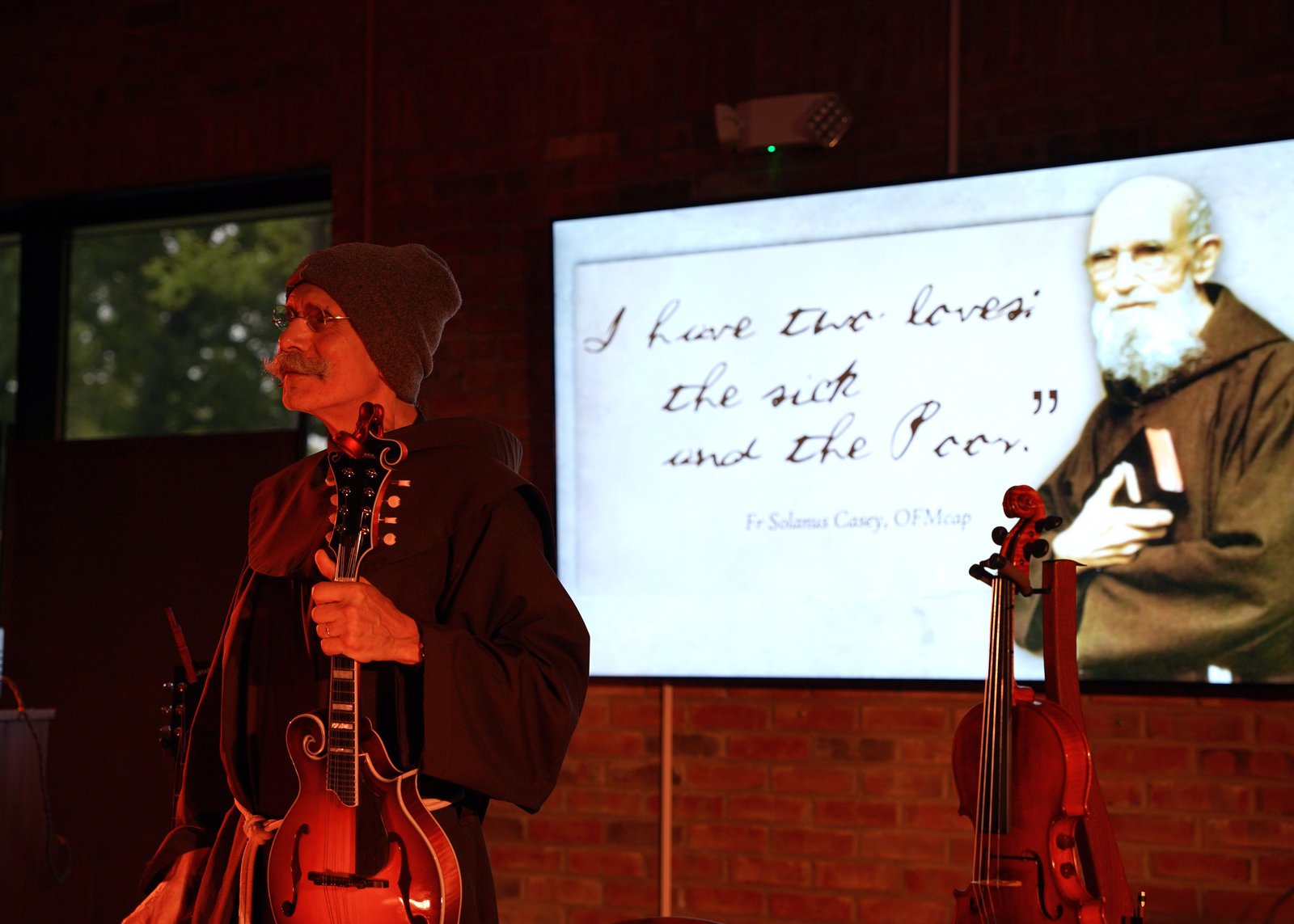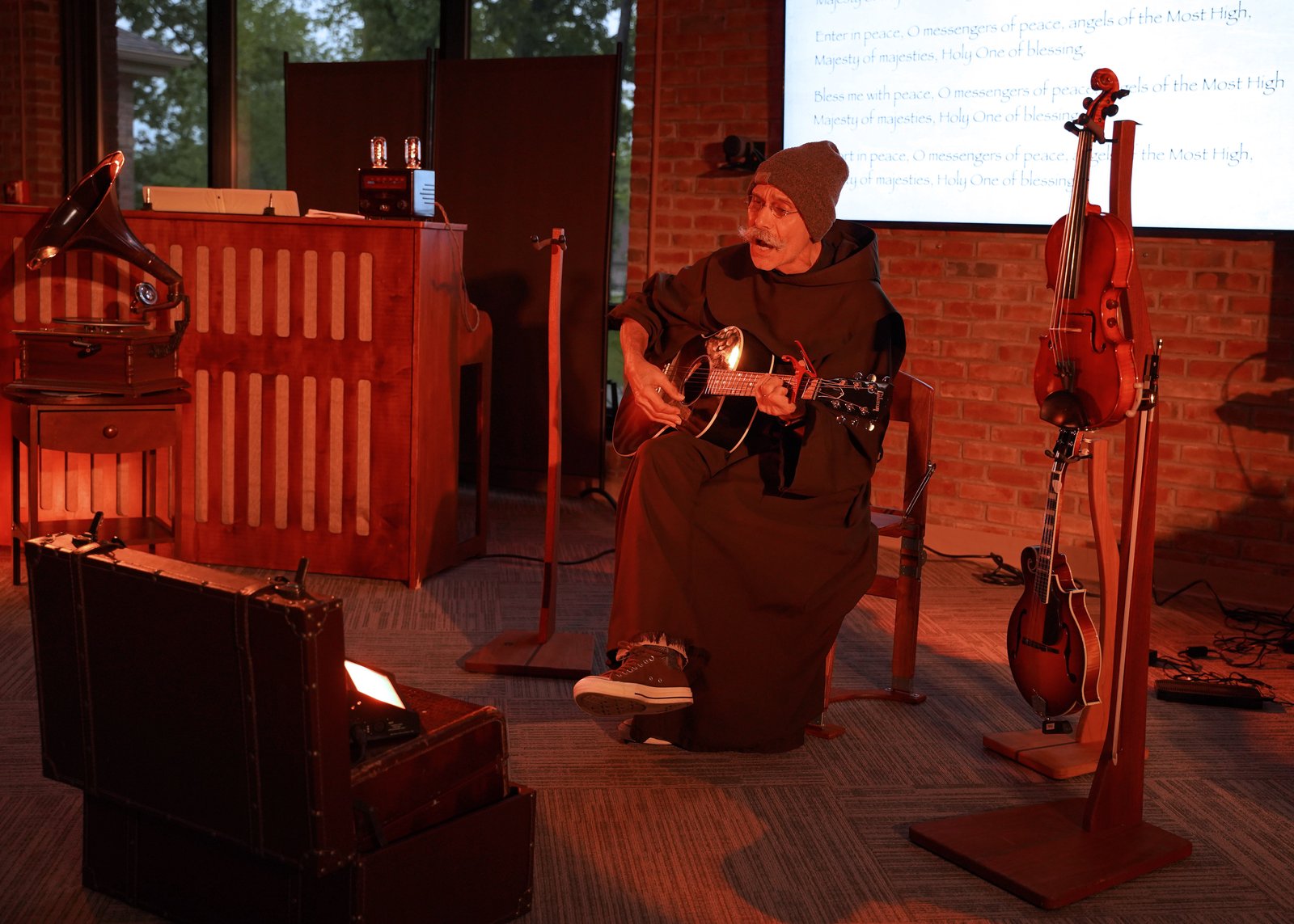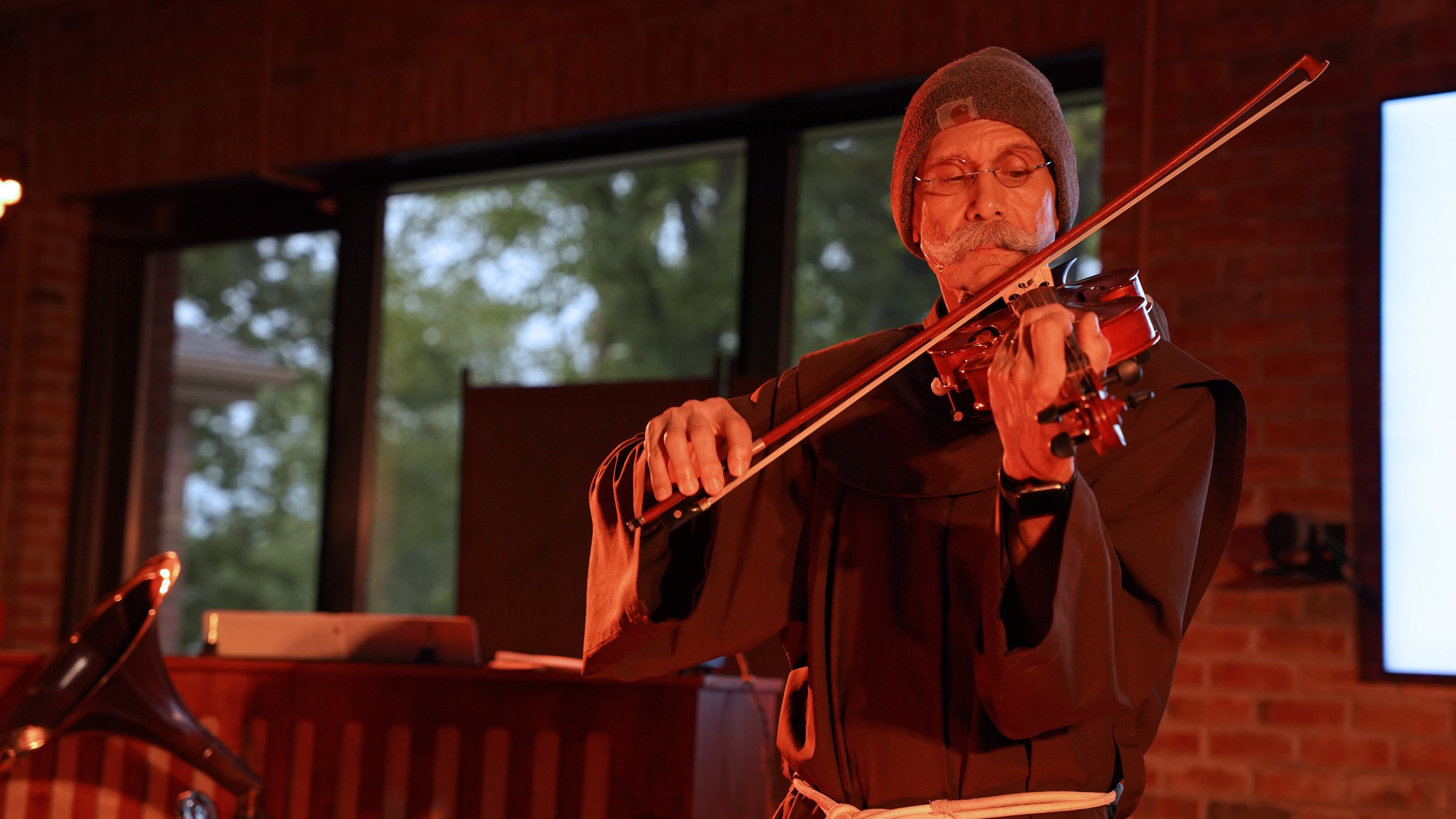Bro. Al Mascia learned the violin to pay tribute to Blessed Solanus Casey, whose love of the instrument touched many hearts
DETROIT — Blessed Solanus Casey is never far from the minds of Catholics in southeast Michigan. Likely to be the first North American man canonized a saint, Blessed Solanus spent most of his days serving in Detroit at St. Bonaventure Monastery until his death in 1957.
Many who knew him are still living and able to tell his stories, and his contemporary Franciscan brothers continue to honor his legacy.
One of these brothers, Bro. Al Mascia, OFM, lives in the Duns Scotus Friary in Berkley and has gotten to know Blessed Solanus intimately through one of their shared love: music.
Beginning in 2022, Bro. Mascia began performing a one-man show, “More Love than Skill: A Saint and His Fiddle,” which tells the story of Blessed Solanus through song. Bro. Mascia, a musician and singer-songwriter himself, wrote the show in its entirety and performs it by himself.
Bro. Mascia began writing the show in 2021 but decided that he couldn’t proceed unless he learned Blessed Solanus’s instrument, the violin.

“I decided I would only take that on if the fiddle that he loved so well could be the main character,” Bro. Mascia explained to Detroit Catholic. “He kept his fiddle by his side. He had a handful of material possessions, but the fiddle was his prize possession. He called it the ‘queen of all instruments.’”
The fiddle, along with a handful of other precious belongings, are on display at the Solanus Casey Center in Detroit.
Bro. Mascia rented a violin and began to take lessons — he likens his own skill level to that of Blessed Solanus’: imperfect but done with great love.
“He just took such great joy in making music and sharing his music with others, even people who had come to him asking for prayer,” Bro. Mascia explained. “There would be lines and lines of people waiting their turn to meet face-to-face with him. He would even take out his fiddle and play music for them.”
When he began writing the show, Bro. Mascia explored the archives and history of Blessed Solanus’s life. He read through his correspondence and notebook entries, learned of his suffering and even came across audio of Blessed Solanus playing the violin and singing. He includes the audio at the beginning of the show.
“I was able to find all sorts of information to present the very human side of this blessed, perhaps the very first American-born man to be canonized a saint, including stories about his would-be fiancé and just material that is otherwise not available to the general public but helps to maintain the multi-dimensional part of who this man was and why his example is so critically important to us especially these days when people are finding their lives to be more joyless than joyful,” Bro. Mascia explained.
Bro. Mascia said that sometimes in our rush to canonize the saints, we lose sight of their humanity, and they become “elevated beyond recognition.”
“All of the rough edges and all the human elements of his life that we all share in common begin to fall away, and we wind up with someone on a pedestal who we are less able to identify with and whose example becomes less realistic once the holiness that they imbue them with takes center stage,” Bro Mascia said. With his show, he hopes to help share the beautiful humanity of the Blessed Solanus.
“Here is a man who contended with just about every intangible challenge in life: from illness to family crises to lack of encouragement from anyone to being denied ordination, being misunderstood, being criticized and throughout it all continued to make music and continued to present to the world a joyful, fulfilled authentic example of what it means to be a human being notwithstanding what life may throw at us,” Bro. Mascia added.
The runtime of the show is anywhere from an hour and 15 minutes to an hour and 30, as it includes some audience participation. Unlike other one-man shows, Bro. Mascia does not portray Blessed Solanus but rather tells his story in a narrative form through words, the reading of letters, audio/visual presentations and, of course, music.

While Bro. Mascia began taking violin lessons in 2021 in preparation for the show, he has long played guitar and piano and has taken up other instruments along the way. With the exception of the violin, he is self-taught.
“He was not a great musician, which is why I took this on, because the violin is one of the hardest instruments to learn how to play, let alone how to play it well,” Bro. Mascia said. “Music was in his DNA; Music was part of his prayer life; Music was part of his healing ministry. As a musician, I resonate with that. It is also a part of his life that stands the risk of being overshadowed by lots of other things…there is more to him than is generally perceived.”
During the run of the show, Bro. Mascia speaks and sings of Blessed Solanus’s struggles and deficiencies and even reads the letter Blessed Solanus was compelled to write when he entered formation with the capuchins after being denied ordination to the priesthood following six years in seminary.
In the letter, Blessed Solanus professes his obedience to his superiors, even if it means not serving as a priest. He was ultimately ordained a priest. However, Bro. Mascia explained that he was made a simplex priest, meaning one without full faculties.
“There were four other men who were also ordained simplex priests at that time,” Bro. Mascia added. “All the other four asked and were granted dispensation and were given full priestly faculties. Solanus never asked – he remained obedient to the promises he made in that letter.”
Bro. Mascia said that he finds this obedience deeply touching as someone who himself professed the evangelical counsels of poverty, chastity and obedience.
“Just to have an example of someone whose ego would not get in the way…he was extremely humble, and the Lord was able to use him, and I think as a doorkeeper and a porter and not a fully sacramental priest, he probably touched the lives of even more people than he ever would have had the tables been turned.”
In addition to learning more about the history of Blessed Solanus Casey, Bro. Mascia hopes that his audience walks away with an understanding of how possible it is to live fully and joyfully under any circumstance, as Blessed Solanus Casey did.
“We have him as a strong and personal example of how that can be manifest. And yes, it involves his being others-centered – his caring for the needs and circumstances of others more than his own,” Bro. Mascia explained. But right next to that is not to deprive yourself of whatever can bring you what little joy you are able to hold onto. And he did not, and I think music with him went hand in glove with the component of being others-centered.”
Bro. Mascia said since its debut, he has performed approximately 16-18 times at churches and senior centers. The show’s form of marketing is word-of-mouth, and he is open to doing more shows, even to taking it nationally.
In celebration of Blessed Solanus Casey’s feast day on Sunday, July 30, Bro. Mascia will put on a special performance of the show at Holy Name Catholic Church in Birmingham. The free performance will begin at 6 p.m., followed by a reception.
At the end of each show, Bro. Mascia invites people to approach a lectern that has a small notebook on it, nearly identical to the one in which Blessed Solanus, by order of his provincial, wrote down miracles associated with his prayers. Bro. Mascia invites people to write down their hopes, dreams, longings, aims and aspirations that they wish could be fulfilled in the notebook.
“I promise: no matter where I am, and however long I live, I will keep that notebook by my side, and through the intercessory prayer of Solanus Casey, I ask that the lord grant you that favor,” Bro. Mascia said. “It is a real humbling experience. There is something about that little ritual we have included at the end of the show that seems to be engaging the religious imaginations of the people to the extent that they are willing to wait in line to write something in that notebook publicly…things that would keep ordinary people from trying to fulfill a dream of theirs but didn’t stop Solanus from music.”
For more information or to book a performance of "More Love Than Skill: A Saint and His Fiddle," visit https://brotheral.org/











